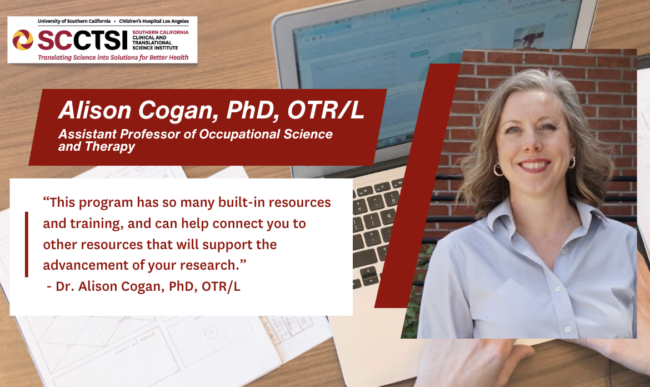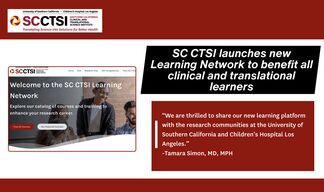Interview with Dr. Alison Cogan, KL2 awardee
We sat down with Dr. Alison Cogan, a recipient of the SC CTSI Mentored Career Development in Clinical and Translational Science award, to hear about her experience as a KL2 scholar and how she has furthered her professional goals. We look forward to seeing all she will accomplish in the coming years.
Tell us a little bit about your experience so far in the KL2 program.
It has been really wonderful during the past year to build my research program in such a supportive community. I feel like I have a whole team of people rooting for me and supporting me in different ways. The clinical translational research course sequence has really helped me to think about “what comes next” in terms of translating my research to clinical practice. The milestone check-ins help keep me on track and adjust my plans when needed. There are so many opportunities to get feedback on different projects like grant proposals and conference presentations.
How did you first learn about the program?
I was initially aware of the program because two of my senior colleagues in my Division are former KL2 scholars. When I joined the faculty, my chair reminded me about the program and encouraged me to apply.

What initially got you interested in starting this program?
There are three program features that really piqued my interest. First, having 75% of my time protected for research was very attractive to me as a tenure-track faculty member. Second, the opportunity to work with my primary mentor in a through a formal mentoring arrangement with support from the KL2 program was important. And third, the opportunity to be part of a cohort with other scholars was a huge plus so that I could build relationships across the university and its hospitals. And I already consider them all my friends.
Tell us about your own background as a researcher in occupational science and occupational therapy.
I was drawn to the occupational therapy profession initially because it was about “living life to the fullest.” As OTs, we help people with different challenges to do the things they need and want to do in everyday life – often things that many of us take for granted, like getting dressed and going to the store. Early on in my training, I became interested in rehabilitation for neurological conditions including brain injury and stroke. As I completed my clinical OT training, I realized that I could have more impact on improving therapy services for brain injury and stroke through research.
I consider myself a health services researcher because I'm most interested in system-level outcomes, and how we can organize healthcare delivery systems to optimize rehabilitation services so that patients with stroke and brain injury attain their highest potential recovery.
What drove you to specialize in this?
The long-term goal of my research is to support return to full community participation for adults with brain injury and stroke. This outcome is impeded when people are struggling with their basic mobility and self-care activities. We are also experiencing changes in Medicare payment models for rehabilitation, so delivery of high quality, high value care is paramount. Putting all this together, my hope is that my research generates knowledge and tools to help occupational therapists, physical therapists, and speech-language pathologists in inpatient rehabilitation settings to provide the best quality care possible so that patients reach the highest level of function possible by the time they are discharged to the community.
What do you think that others can gain from this program?
This program has so many built-in resources and training, and can help connect you to other resources that will support the advancement of your research. It is also valuable for building connections with experts associated with all the different services that SC-CTSI offers, like statistical support and informatics.
Have you run into any challenges or obstacles along the way?
I have been fortunate to not experience any major challenges or obstacles in the program so far.
What has been the most rewarding part of being a part of the KL2 program?
I’m really enjoying getting to know everyone else in my cohort. Everyone is so supportive of each other and working on important problems in healthcare. I learn so much from them.
What does the KL2 program mean to you and how has it furthered your career?
The course series in clinical translational research is great and has really helped me to think more about the translational aspects of my KL2 project as well as other projects I am planning. The course assignments have also helped me to stay on track and move different research products forward. For example, I am working on a grant proposal that I plan to submit at the end of this year, and I am already working on my data analysis plan. Having regular updates helps to track and reflect on my progress.
Who else has been an integral part of your success in this program?
My mentor and co-mentor are both important contributors to my success in the program. I meet with them both regularly, and am building my methodological and leadership skills through this process.



